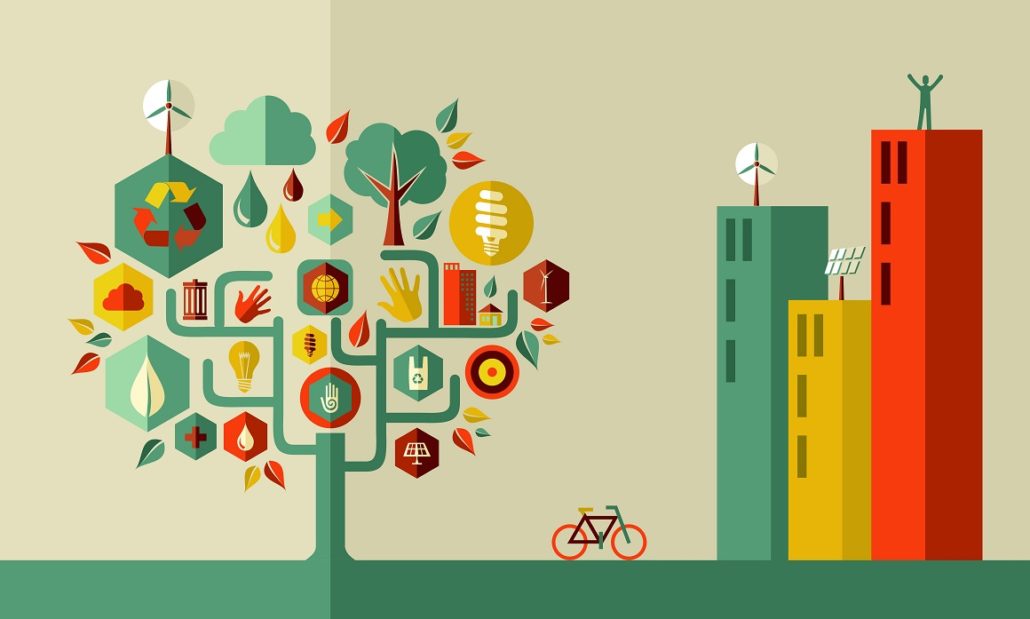
“A sustainable business is resource efficient, respects the environment and is a good neighbor.” (Phil Harding )
The word ‘sustainability’ is often used with reference to renewable fuel sources, reducing carbon emissions, protecting environments, and keeping the delicate ecosystems of our planet in balance. Our perspective is on organizational sustainability but, ultimately, the sustainability of all organizations is dependent on the sustainability of our planet, and we wholeheartedly support the urgently needed overdue efforts in this area.
There is no universally agreed definition of what sustainability means. There are many different views on what it is and how it can be achieved. The idea of sustainability stems from the concept of sustainable development, which became common language at the world’s first Earth Summit in Rio de Janeiro in 1992. The original definition of sustainable development, according to the Brundtland Report of 1987, is usually considered to be “development that meets the needs of the present without compromising the ability of future generations to meet their own needs.” Since then, there have been many variations and extensions on this basic definition.
Business sustainability may therefore be described as cohesively managing and integrating the financial, social, and environmental facets of the business to meet the needs of the present without compromising future performance. It is about creating long-term value for all stakeholders (investors, customers, employees, service partner organizations, local communities, etc. – and some people consider the planet to be another stakeholder).
Sustainability on the move
Investors and rating agencies are increasingly considering businesses’ environmental, social and governance (ESG) risks, as sustainability moves up the political agenda. Social risks are typically those that affect the community in which a company operates, such as through health and safety, working conditions or economic opportunity. As an indicator, ESG news in April 2020 had almost double the coverage compared to November 2019. Investors are anticipated to spend $1 billion on ESG data tracking by 2021 (20% per annum growth).
BlackRock chairman and CEO Larry Fink has committed to making sustainability the new standard for investing (for the nearly $7 trillion in assets that the company manages) and has outlined several practical ways in which this will be progressed. In June 2020, global giants Google and WWF announced details of their environmental data platform, a joint initiative that aims to tackle harmful emissions and waste across fashion industry supply chains. This will allow fashion brands to source raw materials and track their sustainability, providing them with greater transparency over the environmental impact of their supply chains.
The triple bottom line theory expands the traditional accounting framework to include two other performance areas: the social and environmental impacts of a company. These three bottom lines are often referred to as the three P’s: people, planet, and profit. B Corps are businesses that give as much consideration to their social and environmental impact as they do to their financial returns. B Corporation certification (assessed by the not-for-profit B Lab) is given to for-profit organizations that achieve at least a minimum score against a set of social and environmental standards. B Corps have been around in the USA since 2007, with brands such as Ben & Jerry’s and Patagonia achieving certification.
To date, there are over 3,000 Certified B Corps in 150 industries and 70 countries, and over 70,000 companies use the B Impact Assessment. B Lab was named in Fast Company’s prestigious annual list of the World’s Most Innovative Companies for 2020, landing at number five in the not-for-profit sector list. Since UK B Corps was launched in 2015, members have experienced an average 14% year-on-year growth rate (national economic growth 0.5%).
Values are the key
We believe that the reason this movement and B Corp companies perform so well is because they are creating a sense of shared values with all stakeholders, especially customers and employees. There is a growing body of research showing that there is a strong link between financial performance and values-driven organizations.
“Without exception, the dominance and coherence of culture proved to be an essential quality of the excellent companies.” (Tom Peters and Robert Waterman )
The key point here is that values must be alive to add value. We use the phrase ‘values are for living, not laminating’ because all too often in organizations, values are just words (and the same ones from one organization to the next) but they do not translate into practices or ‘the way things work around here.’ A recent study revealed that there is no correlation between the cultural values a company emphasizes in its published statements and how well the company lives up to those values in the eyes of employees. The SERVICEBRAND framework helps to make this happen at several levels:
• The Brand Identity Element identifies the organization’s purpose and values
• The activities in the Employee Engagement and Customer Experience Elements are explicitly informed by the purpose and values
• The activities in the Systems & Processes Element are consciously designed to support the first three Elements
• The Measurement & Insight Element helps to identify a range of whole-system metrics to monitor, assess and guide performance
This is how using the SERVICEBRAND approach can help to deliver sustained performance over time.
What implications does the topic of sustainability have for your implementation of the SERVICEBRAND approach and each of the five Elements? What opportunities does it present? What challenges and obstacles will you need to overcome?
SERVICEBRAND
If you are struggling and battling with the creation of sustainable strategies and processes, why not see what SERVICEBRAND Global can do to help. We believe in connecting people with their true values so they can be of service to the world around them, while still turning a profit.

